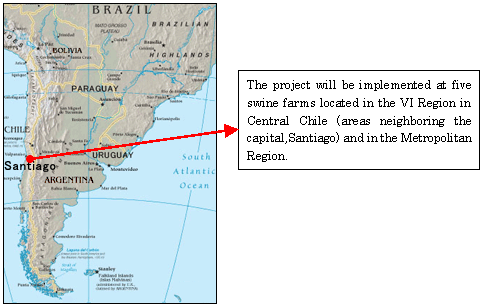Tokyo Electric Power Co. (TEPCO) will purchase emissions reduction credits
or carbon credits*1 of approximately 2 million tons (carbon dioxide
equivalent) over a period of nine years between 2004 and 2012, which are
generated from the methane recovery project of Chilean major food
processing company Agricola Super Limitada*2. Approval by the Japanese
Government is required for the project to be registered as a Clean
Development Mechanism*3 project, one of the Kyoto Mechanisms, and TEPCO has
hereby filed an application of approval to Ministry of Economy, Trade and
Industry.
Agricola Super Limitada has been engaged in the treatment of swine manures
in Chile (natural digestion and management of precipitated sludge at open
waste storage lagoons) in accordance with relevant laws, and it has so far
released methane produced in the process into the air due to the absence of
regulations.
The new project features a state-of-the-art closed manure treatment system
that utilizes bacteria for digesting swine manure to recover and flare
methane, whose greenhouse effects are 21 times greater than carbon dioxide,
thereby reducing greenhouse gas emissions*4. Through this method, it is
expected that as much as 400,000 tons of greenhouse gases (carbon dioxide
equivalent) will be reduced annually, and also stemming bad odors and
contributing to the preservation of the community environment. This project
has been already approved by the Chilean Government as a CDM project.
Preserving the environment is a top priority for TEPCO. We earnestly
promote measures to fight global warming within Japan and in addition,
TEPCO acquires carbon credits through active cooperation in overseas
projects, such as making contributions to the "Prototype Carbon Fund" and
"Bio Carbon Fund," of the World Bank ahead of many other Japanese
companies. This is the first CDM project for TEPCO that involves a direct
purchase of carbon credits from the CDM project operator. TEPCO is willing
to continue its efforts to work for the preservation of the environment at
home and overseas.
A ceremony to mark the signing of the agreement will be held on August 24
in Santiago, Chile, at 11 a.m. local time, and midnight Japan Standard
Time, under the auspices of Agricola Super Limitada. Dignitaries and
officials from both the Chilean and Japanese governments are expected to
attend.
*Note 1 Carbon credit
Rights to offset greenhouse gas emissions in industrialized and
transitional economies with emissions reductions/absorption.
*Note 2 Agricola Super Limitada
*Name: Agricola Super Limitada
*Head Office: Rancagua, Chile
*Chairman: Mr. Gonzalo Vial
*Established: 1982
*Sales: About \25 billion (2001 results)
*Capital: About \1.8 billion
*Business: Affiliated with the Agro Super Group, Chile's
largest meat processing group that controls food
production, processing and sales companies
Breeding of chickens and swines (owns about 2,000
chicken and swine houses). Its main business is
processing and producing approximately 200,000 tons
of meat a year.
The company opened its Tokyo Office in 2004, with the aim of
promoting the distribution of meat, fruits and wine in Asian markets
*Note 3 Clean Development Mechanism (CDM)
This is a mechanism under which industrialized and transitional
economies conduct projects in developing countries to reduce
emissions (or enhance absorption) of greenhouse gases, and use the
amount of emissions reduction resulting from the project as credits.
CDM is one of the three flexible mechanisms of the Kyoto Protocol
(Kyoto Mechanism), along with Joint Implementation (JI) and
Emissions Trading (ET).
Kyoto Mechanism is the economic mechanism that aims to reduce
greenhouse gas emissions more flexibly, as stipulated by the Kyoto
Protocol adopted at the Third Conference of Parties to the United
Nations Framework Convention on Climate Change (COP3), held in
Kyoto in 1997.
*Note 4 Methane
Methane has greenhouse effects 21 times that of carbon dioxide, and
so greenhouse gas emissions can be reduced significantly by
transforming methane into carbon dioxide and water through
combustion.
(Reference)
 |
|